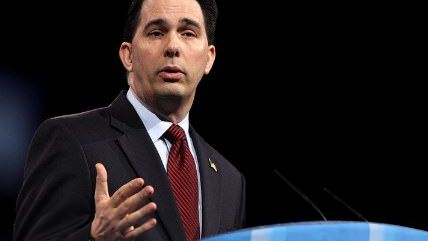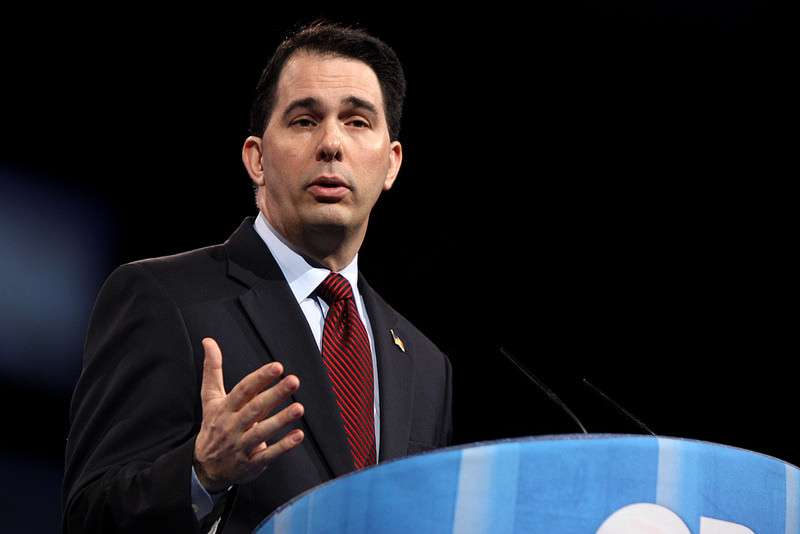Scott Walker's Anti-Gay Marriage Positions Displease His Own Family
There is no political future in fighting government recognition


Wisconsin Gov. Scott Walker has never been a supporter of same-sex marriage in his politics. Prior to becoming governor he vocally supported his state's constitutional amendment defining marriage for heterosexuals only.
As polls started showing more and more support for government recognition of gay marriages, Walker didn't exactly flip-flop or even "pivot," exactly, but he did back off and argue that there were more important matters for the Republican Party to attend to. It made sense for Walker to want to push the issue away. Yes, he's the son of a Baptist preacher, but his niche in the presidential race (not that he has announced yet) has been as a problem-solving, pragmatic business conservative with actual small-government credentials and the ability to fight back public sector union largesse (read Peter Suderman's recent Reason profile here).
Then Walker became one of the frontrunners for the Republican nomination, if such a thing could said to exist at this point. He's currently outpolling everybody in the Iowa Republican Caucuses, and he isn't even expected to announce his candidacy until next week.
Now he seems to have gone back to his earlier anti-same-sex marriage position, even as it becomes less and less a disputed topic. Earlier in the year he said he supported a Constitutional amendment that would make sure that states would have the authority to decide their own marriage rules. He reiterated his position after the Supreme Court ruled that states must recognize same-sex marriages. He said in a statement, "[T]he only alternative left for the American people is to support an Amendment to the U.S. Constitution to reaffirm the ability of the states to continue to define marriage."
There is no chance that such a constitutional amendment would ever come about. A weekend profile of Walker's wife, Tonette, in The Washington Post, gives very good insight as to why: Walker's own wife and two sons don't even support his position. He can't even get his own household on board to oppose gay marriage recognition:
In the political world, Walker drew immediate scrutiny for being particularly strident. In their house, Tonette Walker heard immediately about her husband's response from the couple's two sons, Matt and Alex, who are taking time off from college to help their father's campaign. She told them to talk directly to him.
"That was a hard one," Tonette said, pausing and choosing her words carefully. "Our sons were disappointed. .?.?. I was torn. I have children who are very passionate [in favor of same-sex marriage], and Scott was on his side very passionate."
"It's hard for me because I have a cousin who I love dearly — she is like a sister to me — who is married to a woman, her partner of 18 years," she said.
She said her son Alex was her cousin's best man at their wedding last year.
The Washington Post noted that in a subsequent speech with donors in Colorado, his tone softened a bit and he did not repeat his claim that the Supreme Court decision was a "grave mistake."
It is a little bit curious—in this day of micromanaged campaign messaging—that the Walker family is comfortable enough going on the record in opposition to their patriarch's stated position. The way Walker himself frames it is that disagreement with his family on his positions helps him "find a better way of explaining it, so they can appreciate where I come from."
But where Walker is coming from may not be as important as where the debate is going. Walker's millennial kids know which way the wind is blowing—or rather, which way they and their peers are blowing it. Millennials overwhelmingly support gay marriage. Even millennial Republican support for gay marriage recognition has hit 50 percent. Support for gay marriage recognition among evangelical millennials is at 43 percent, compared to 33 percent among evangelical Gen-Xers and 22 percent among evangelical Baby Boomers.
There is no long-term cultural or political support for Walker's position, so what is he going to do with these comments after the Iowa caucuses (along with his flip-flopping on ethanol subsidies and immigration)? Will this position even last until the caucuses, which aren't even until next February? It's worth wondering how far he will go to appeal to a vanishing demographic within the Republican Party when it completely distracts from his performance record with a proposal that will never go anywhere. If a Republican can't win a primary without seriously damaging the hell out of his or her general election chances (imagine how the discord in the Walker house is going to be used in a year by the Democrats if he maintains his current position on gay marriage and gets the nomination), they're pretty hosed.
